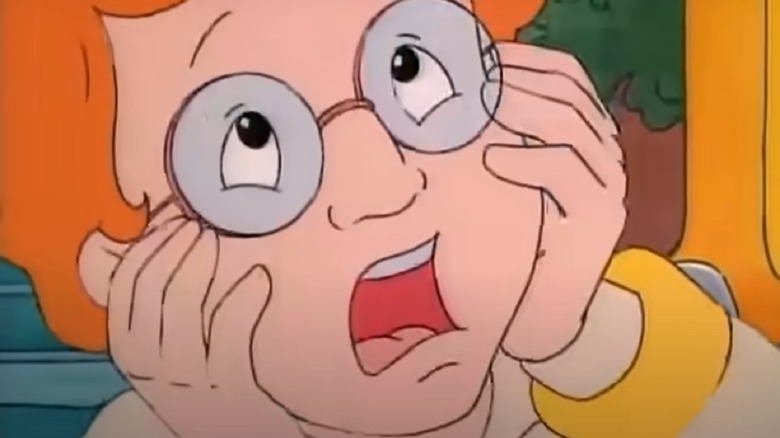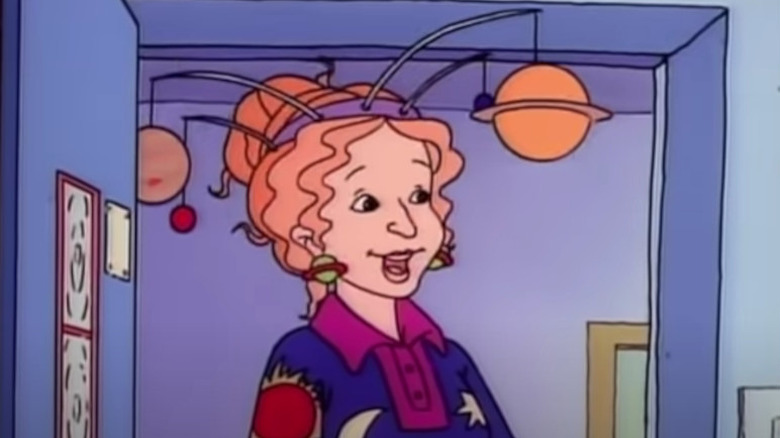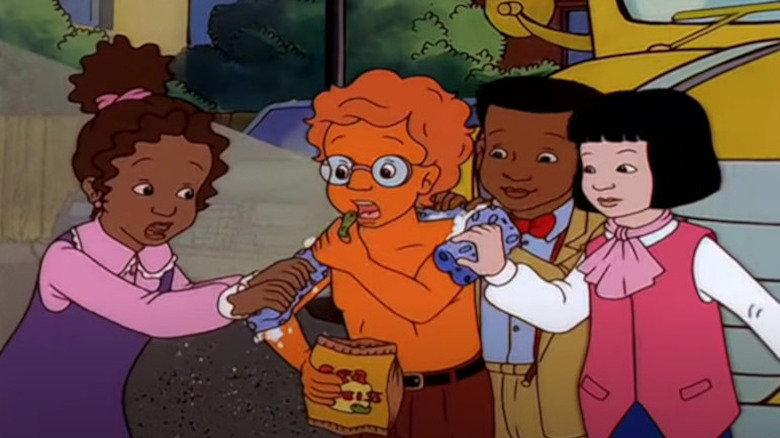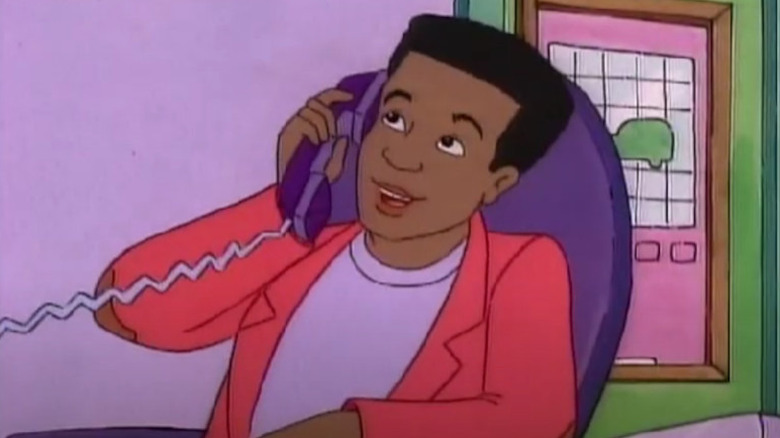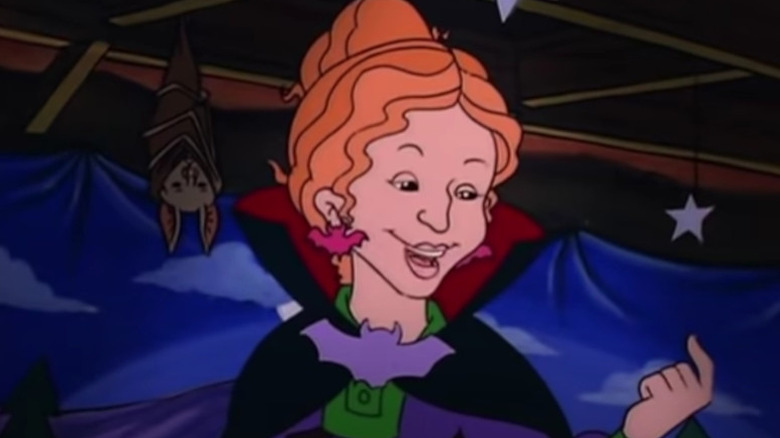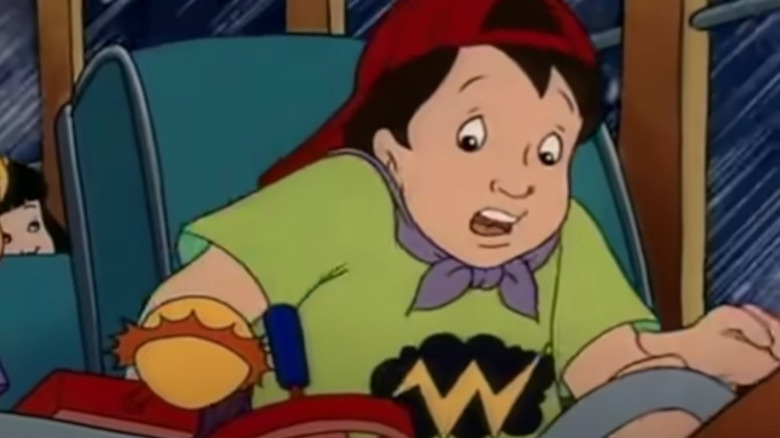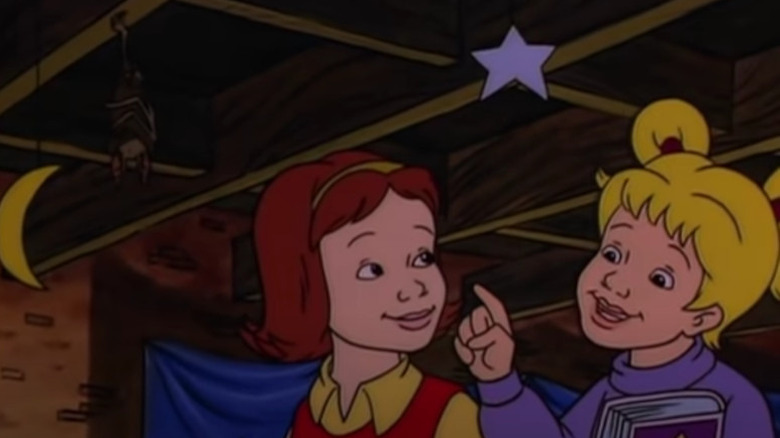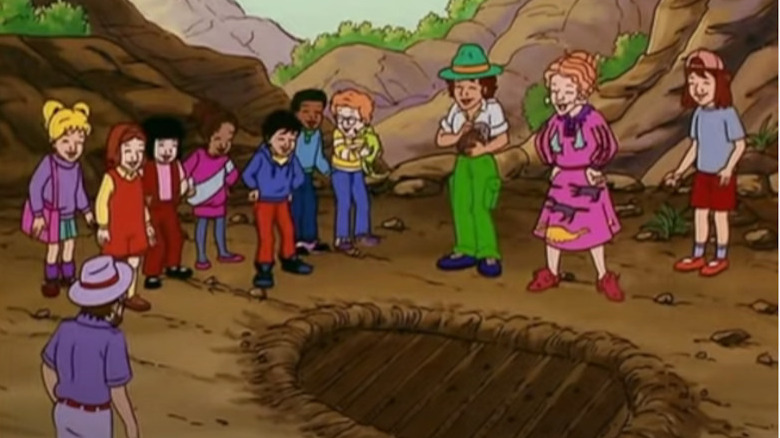Things Only Adults Notice In The Magic School Bus
There is something wonderfully nostalgic about revisiting old childhood shows, and with many of them available to stream, they can be hard to resist. We want to know if they live up to our memories and if we now perceive them differently, having grown up. Whether you're watching them for your own sake or sharing them with your kids, the chances are you'll notice some things that went over your head all those years ago. As is so often the case with these older shows, there are things going on that we just don't notice until we're adults.
"The Magic School Bus" is no exception, despite its educational value. While this classic '90s show has definite merits and represents a love of learning, there's some questionable stuff when we look back. These things range from confusing to downright dangerous. One thing is for sure — you're in for a wild ride when you take a spin on this bus.
Ms. Frizzle doesn't tell the parents where the kids are going
One thing that is sure to bother the moms and dads out there is that Ms. Frizzle takes her students wherever she likes without permission. These are dangerous and outlandish field trips, yet the parents don't really know where their kids are going. One of the kids, Arnold, begs not to go on these trips almost every time, but he essentially gets bullied into it.
While taking the kids to the planetarium in the very first episode would have been fine, Ms. Frizzle takes them into outer space instead. If a real teacher routinely lied to parents about where she was taking their kids, they probably wouldn't be in the job for very long. The places she takes them are often dangerous, and it's surprising that nobody ever got hurt — or worse. From the Ice Age and the Cretaceous Period to outer space and even the digestive system, these aren't exactly tame trips.
Arnold had absent parents
No one seems at all concerned about the fact that Arnold ate nothing but Sea Wheedies for an entire month, which turns him orange because of the amount of beta carotene in Season 4's "Goes Cellular." As an adult, this is a really strange episode. While it provides an interesting look at cells and what would happen if you did ingest that much beta carotene, there's one big issue here.
The problem lies in the fact that Arnold's parents must either be gone or they truly don't care about him. Neither of these explanations makes much sense. Yet, no parent would let their kid consume the same junk for a month straight without eating anything else. It would be a dangerous idea, and he could have gotten really sick. Instead of helping him, however, Ms. Frizzle uses his problem as a learning experience for the rest of the class.
One of the producers has a familiar voice
Episodes of "The Magic School Bus" finished with a segment called Producer Says, which gave the creators the chance to clear up plot holes and discuss inaccuracies. The show did take some liberties for the purposes of entertainment, and it addressed these in the form of kids calling in to complain. The segments set the record straight and provided some additional wisdom, but as an adult, the first thing you'll probably notice about them is a familiar voice.
As a kid, you most likely didn't know that one of the producers from the end-of-show segment was a known actor. Malcolm-Jamal Warner, who played Theo on "The Cosby Show," plays one of the producers who fields questions. While you won't recognize him from the animated character, there's every chance you'll know his voice. You may also know Warner as Malcolm McGee from the sitcom "Malcolm & Eddie," and from the medical drama "The Resident," in which he plays Dr. AJ Austin.
Some episodes are inspired by classic movie monsters
When you're a kid, some of the references in "The Magic School Bus" go right over your head. Something that children are unlikely to pick up on is that there are nods to classic movie monsters within the show. Horror movie references in a children's educational show might seem like a bit of an odd choice, but that's just what "The Magic School Bus" does. Let's take a look at two examples — Season 2's "Going Batty" and Season 3's "Spins a Web."
In "Going Batty," the class is studying nocturnal creatures. When they find a bat hanging in the attic, Ms. Frizzle suddenly appears from nowhere, dressed (and speaking) like Bela Lugosi's Dracula. In "Spins a Web," the class goes to a drive-in movie theater, where a fictional '50s film called "Stand by Your Mantis" is playing. Not only is the title of the made-up monster movie a joke that only adults would get (it's obviously a play on the much-covered Tammy Wynette song "Stand by Your Man"), but the film itself is clearly inspired by 1957's "The Deadly Mantis," which also features a giant praying mantis as the villain.
There is no way Ralphie could drive the bus
The titular vehicle from "The Magic School Bus" has a scary amount of power and should only be handled with care. Letting the children take over the bus knowing what it can do seems like a terrible idea, but Ms. Frizzle does it anyway. In Season 1's "Kicks Up a Storm," she not only gives a student full control over the bus, but she also lets him drive it. Needless to say, this could have had disastrous consequences for them all.
Ignoring the fact that Ralphie could accidentally hit any button at any time, he isn't tall enough to even reach the pedals, so it makes no sense that he can control the bus. Ms. Frizzle and the rest of the class venture out to learn about weather, and she leaves him in charge. This seems like a huge mistake on her part, and really doesn't make any sense when you see it as an adult. Kids will probably think it's fun, though.
It helps with overcoming fears
The educational value of "The Magic School Bus" is no secret. The show tackles a great number of subjects, entertaining kids while arming them with knowledge. The show also helps kids to overcome fears, but it does this so subtly that you only really notice it when you're watching as an adult. The episodes that reference classic movie monsters are great examples of this, helping young viewers get a better understanding of commonly feared animals.
While bats (and praying mantises, for that matter) are often seen as scary and creepy, there's a lot more to them than most kids realize. By normalizing these animals and showing kids more about them, the show can actually help children get over their fears. They may come out of watching these episodes with a better understanding, safe in the knowledge that they don't need to be scared of these wonderful creatures.
They change things in the past that would have big consequences
If there's anything we have learned from time travel movies over the years, it's that there are usually huge repercussions if you go messing around in the past. You could completely mess things up for yourself and for everyone else. Despite this, Ms. Frizzle takes the kids back in time in Season 2's "The Busasaurus," and quite a way back — 67 million years, to be exact. While all kids love dinosaurs, and this is indeed a fun episode, grownups will regard it with skepticism. Not only could the kids get eaten by dinosaurs, but they could also bring something back with them that messes up the future.
The biggest risk is the butterfly effect — the idea that small changes in one place can lead to huge consequences in another. There is even a scene that shows that something did change due to their actions in the past, confusing the paleontologists in the present. Arnold — the kid who hates Ms. Frizzle's field trips, let's not forget — was enlarged and left behind a huge shoe print. The smile on Ms. Frizzle's face indicates that she isn't worrying about the potential ramifications.
